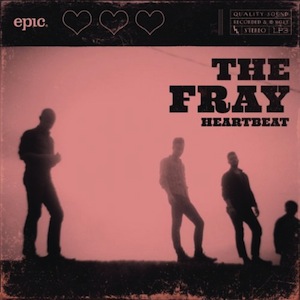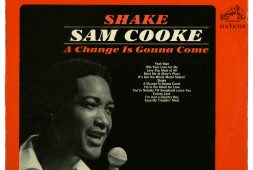 Main Point of Discussion
Main Point of Discussion
When things look hopeless, God always gives us a reason to hope.
The Song
“Heartbeat”
Your kids probably know a little bit about The Fray, the Denver-based pop-rock quartet that’s been straddling the worlds of mainstream and Christian music for a few years. The band’s debut, How to Save a Life (2005), got plenty of attention due in no small part to its singles, “Over My Head (Cable Car)”—a monster hit in the mainstream charts—as well as the even-more-popular album title track, which hit #3 on the Billboard Hot 100 after the TV show Grey’s Anatomy picked it up.
A second release (plus a Christmas EP) didn’t hit quite the heights as the band’s debut, but with the Fray’s latest effort, Scars and Stories,
you might say the fellas have a “heartbeat” again.
Not coincidentally, that’s also the name of the Fray’s single which has been hanging out for about four months in the Billboard Hot 100, this week sitting at #51. (It’s also made a splash on the iTunes chart, this week at #31.)
If you or your kids have been among the nearly 3.8 million folks who’ve watched the song’s stylish music video http://www.youtube.com/watch?v=hp0_2fjPlbM on YouTube, you might say there’s not much meat behind the visuals (i.e., majestic waves crashing on a torch-lit beach while The Fray plays for a small crowd of hip twentysomethings).
But there is more—much more—that doesn’t meet the eye.
Frontman Isaac Slade talked to Relevant Magazine http://www.relevantmagazine.com/culture/music/features/28203-the-deeper-side-of-the-fray recently about the new album—and the impetus behind the band’s newest single, “Heartbeat”:
“All of our songs are grounded in personal experiences…’Heartbeat’…came from a trip I took to Kigali where I actually felt the pulse of this woman’s hand. We were all standing around praying for the food before lunch. It was like I could feel Rwanda coming back to life—like she was the country herself. I went outside, and I remember I busted out my iPhone to record an idea for the song. I turned the corner and there were five or six little school kids singing, and shouting, and jumping up and down, and laughing, and pointing at me and yelling—like they knew I was singing about them or something. So if there is any hope in that song, it just kind of came from walking the streets of the capital that was littered with bodies 20 years ago. To where it is now, it’s coming alive. I just tried to capture that feeling. I think if you put hope in songs on purpose it just feels like Botox. It has to be something you actually sense for real.”
Sorta makes you wonder why the band didn’t just simply recreate Slade’s real-life moment for the video in the first place—that would’ve been an eye opener.
The Music Video:
The song’s video can be found at the following link: http://www.youtube.com/watch?v=hp0_2fjPlbM
Introducing the Song
We’re about to take a deeper look at the song “Heartbeat” by The Fray; we’ll also discuss what the band has to say about the tune. The bottom line is that the song’s video doesn’t begin to capture what was really going on in Isaac Slade’s head when he wrote it.
(Pass out the lyrics and play the song—preferably the music video linked above.)
Song Lyrics
We’re on an open-bed truck on the highway
Rain is coming down, and we’re on the run
Think I can feel the breath in your body
We gotta keep on running ‘til we see the sun
Oh you gotta fire and it’s burnin’ in the rain
Thought that it went out, but it’s burnin’ just the same
And you don’t look back, not for anything
‘Cause love someone, love them all the same
If you love someone, love them all the same
Oh I feel your heartbeat
And oh, you’re comin’ around, comin’ around, comin’ around
If you can love somebody, love them all the same
You gotta love somebody, love them all the same
I’m singing, oh, I’m feeling your heartbeat
I’m tryin’ to put it all back together
I’ve got a story, and I’m tryin’ to tell it right
I’ve got the kerosene and the desire
I’m trying to start a flame in the heart of the night
I know the memories rushing into mind
I want to kiss your scars tonight
I’m laying here,
‘Cause you’ve gotta try, you’ve gotta let me in, let me in
Oh I feel your heartbeat
And oh, you’re comin’ around, comin’ around, comin’ around
You love somebody, you gotta, you gotta love somebody
You gotta, I’m singing, oh, I feel your heartbeat
All your heartbeat, yeah, I said
All your heartbeat, yeah
All your heartbeat
Transitional Statement
The song’s melody and (especially) the music video for “Heartbeat” are definitely cool and slick. But after watching the video, you might be surprised that the song’s creator got his inspiration for the tune through an experience that’s about as far removed from pop-song “cool” as you can get. Let’s talk about it, as well as what the Bible has to say about hope in the midst of hopelessness.
Divide into Small Groups
Let’s split into our discussion groups, and then afterward we’ll come together for a final word.
CLICK HERE for a quick training article on how to maximize your small groups using our small group format—a great resource to equip your small group leaders.
Discussion Questions
- AROUND THE CIRCLE: Before we dive in, everybody tell us your name and what was happening to you or around you the last time it felt like your heart was going to just pound out of your chest (e.g., scary experience, big surprise, etc.).
- ASK A FEW: After watching the “Heartbeat” music video and reading the lyrics, what do you sense The Fray is trying to say through this song? (If your students are getting stuck, that may not be surprising, as the lyrics are pretty vague. Some possible answers: Someone who’s in love and wanting it to be a mutual feeling; someone who’s concerned about a loved one and reaching out…but neither response really hits home.)
- ASK A FEW: Wow! That’s a whole lot different from what the music video seems to say about the song, eh? Okay, given that explanation by the songwriter himself, how do you now interpret the song’s themes? (Leader—answers you’re looking for: He’s singing about the process of rebirth; getting up after you’ve fallen down; finding hope in the midst of hopelessness.)
- ASK A FEW: Check out these lyrics in the chorus: “Oh you gotta fire and it’s burnin’ in the rain / Thought that it went out, but it’s burnin’ just the same / And you don’t look back, not for anything…” What kinds of images do these lines bring up in your mind, especially related to the idea of hope in the midst of hopelessness? (Leader—answers you’re looking for: Relief after someone who’s really sick suddenly gets better; relief after someone who’s been depressed or even suicidal comes out it…)
- ASK A FEW: Given the band’s Christian convictions and the songwriter’s explanation, those lyrics seem to indicate that—with God—hope is always just around the corner even when you’re walking down “Hopelessness Street.” Can a few of you share some stories where that has proven true in your lives?
- ASK A FEW: In this passage, Paul is referring to the miracle of Abraham becoming a father at 100 years of age—and when his wife, Sarah, was unable to bear children. In spite of the physical facts, who does verse 17 say Abraham believed in? (Leader—answer you’re looking for: God.)
- ASK A FEW: What humanly impossible feat does verse 17 say that God does? (Leader—answer you’re looking for: God “gives life to the dead and calls into being things that were not.”)
- ASK A FEW: Is this biblical declaration something that’s easy for you to believe…or difficult? Why/why not?
- ASK A FEW: One of the next lyrics in the song is: “If you can love somebody, love them all the same…” Do you believe that means “love everybody the same?” Or “if you love someone, you need to love that person no matter what he or she is going through?” Why? (Leader—answer you’re looking for: The grammar is a bit off, but it seems as though it’s the second option—we need to love our loved ones no matter what…)
- ASK A FEW: What do you suppose is the connection between a person having strong hope in God in the midst of hopelessness and being loved by others—or at least one person—no matter what?
- ASK A FEW: When you notice that others are behaving “unswervingly,” what does that look like? (Leader—answer you’re looking for: They’re going straight ahead; not veering right or left or going around in circles…)
- ASK A FEW: What is the writer of Hebrews telling us to do “unswervingly?” (Leader—answer you’re looking for: holding to the hope we profess…)
- ASK A FEW: What reason do we have for maintaining such unswerving hope? (Leader—answer you’re looking for: because God, who promised to give us life where there was no life, is faithful!)
- ASK A FEW: What do verses 24 and 25 say goes hand in hand with having such hope? (Leader—answer you’re looking for: Spurring each other on toward love and good deeds; continue meeting together; encouraging each other…)
- ASK A FEW: If God is faithful and provides us hope and life anyway, why does the Bible emphasize that we need to love each other, too? I mean, since God is going to do what God is going to do, why does our mutual love/encouragement matter so much? (Leader—answers you’re looking for: First of all, because that’s simply how God set it up; secondly, God wants us to experience his love for us directly…as well as through loving each other with the love God first gave each of us!)
- ASK A FEW: One of the last lines in the song is “I want to kiss your scars tonight…” and then leading to a plea: “…you’ve gotta let me in, let me in.” Do you believe these lyrics describe God reaching out to love us and comfort us in the midst of hopeless situations? If so, why? If not, why not?
- AROUND THE CIRCLE: What can we each do in our individual lives (and as a community of brothers and sisters in Christ) to recognize and accept God’s constant reach to give us hope?
LEADERS: Be ready to address the holocaust in Rwanda from 1994; here is a story that will help with that task: http://itslikethis.org/?p=2682. Then say, “You might be surprised, but Isaac Slade told Relevant Magazine a pretty interesting story behind the creation of “Heartbeat.” Check this out.”
- “[It] came from a trip I took to Kigali where I actually felt the pulse of this woman’s hand. We were all standing around praying for the food before lunch. It was like I could feel Rwanda coming back to life—like she was the country herself. I went outside, and I remember I busted out my iPhone to record an idea for the song. I turned the corner and there were five or six little school kids singing, and shouting, and jumping up and down, and laughing, and pointing at me and yelling—like they knew I was singing about them or something. So if there is any hope in that song, it just kind of came from walking the streets of the capital that was littered with bodies 20 years ago. To where it is now, it’s coming alive. I just tried to capture that feeling. I think if you put hope in songs on purpose it just feels like Botox. It has to be something you actually sense for real.”
Read the following passage from the Bible:
- Romans 4:17-19 (NIV)
17 As it is written: “I have made you a father of many nations.” He is our father in the sight of God, in whom he believed—the God who gives life to the dead and calls into being things that were not.
18 Against all hope, Abraham in hope believed and so became the father of many nations, just as it had been said to him, “So shall your offspring be.” 19 Without weakening in his faith, he faced the fact that his body was as good as dead—since he was about a hundred years old—and that Sarah’s womb was also dead.
Read the following passage from the Bible:
- Hebrews 10:23-25 (NIV)
23 Let us hold unswervingly to the hope we profess, for he who promised is faithful. 24 And let us consider how we may spur one another on toward love and good deeds, 25 not giving up meeting together, as some are in the habit of doing, but encouraging one another—and all the more as you see the Day approaching.
Wrap Up
We’re living in perilous times. The world economy is still really bad. A lot of people are out of work. Nations all over the globe can’t pay their bills, either—and there are protests and even riots because of how uncertain things are.
Plus, young people everywhere are graduating from high school and college without decent job prospects—and those lucky enough to even finish college are usually saddled with student loans that are getting harder and harder to pay back.
And that’s just the beginning of our planet’s many troubles. You can all read the headlines. They indicate that there’s not much reason for having a hopeful attitude. I mean, where is God really in the midst of all these troubles? (And to be fair, a lot of us are just starting to feel the general hardships—many, many countries have been living with a sense of uncertainty, unrest, and hopelessness for decades…even centuries. Only now are we “catching up” here in the West.)
But as we’ve seen from God’s love letter to us, the Bible, Jesus is in the business of giving hope where no one on his or her own could possible experience it.
And that’s just it.
The phrases “on my own” and “on your own” have no place in God’s eternally hopeful community. Because as we’ve learned, it’s in the midst of community and being together—praying, loving, encouraging, crying, comforting—that Jesus most readily and powerfully comes alive; Christ’s hope is supposed to be a shared experience!
So before we close in prayer, I want you all to close your eyes and think about what a community like that would look like in your own lives. Even more…can our group become that kind of community? If we are that type of community, how can we be even more attuned to God’s mission of providing hope where hope by any human standard has no place existing?
Let’s pray that God will show us tangible, practical ways we can “become” hope for each other…and for our larger communities…and for the world.
Close in Prayer
Written by David Urbanski
Jonathan McKee
Jonathan McKee is the author of over twenty books including the brand new The Guy's Guide to FOUR BATTLES Every Young Man Must Face; The Teen’s Guide to Social Media & Mobile Devices; If I Had a Parenting Do Over; and the Amazon Best Seller - The Guy's Guide to God, Girls and the Phone in Your Pocket. He speaks to parents and leaders worldwide, all while providing free resources for youth workers on TheSource4YM.com. Jonathan, his wife Lori, and their three kids live in California.



